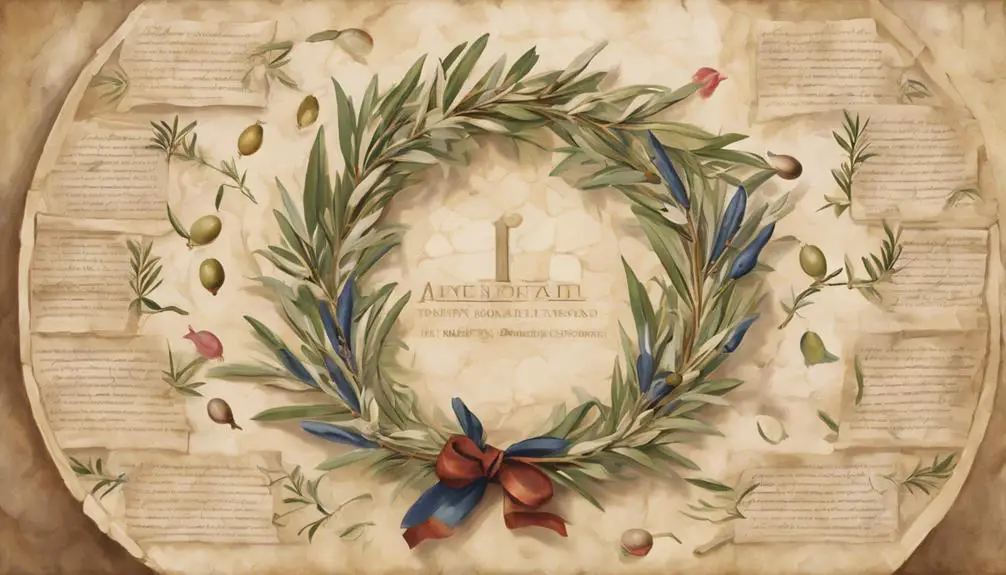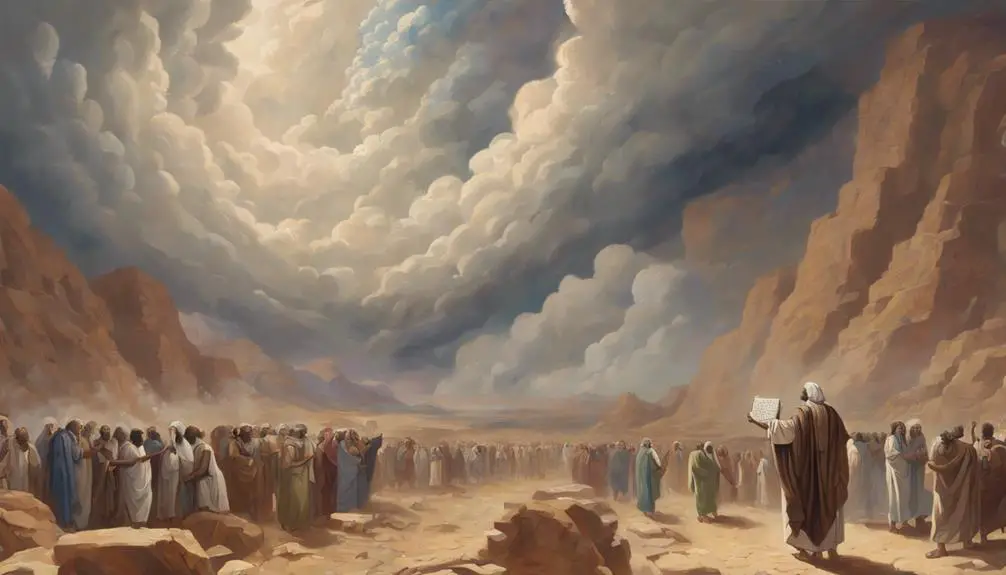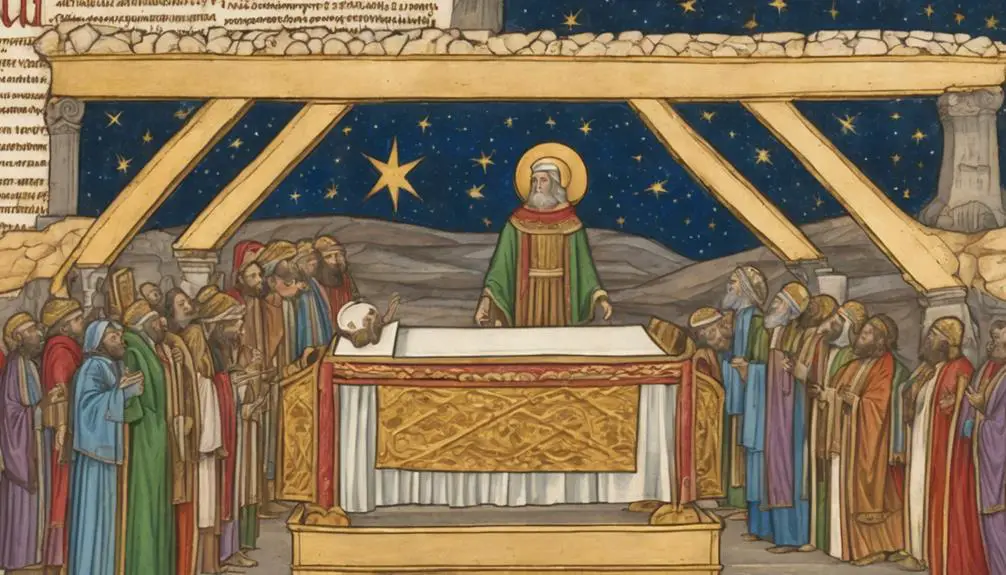Gain insights into the 8 covenants in the Bible, uncovering their impact on spiritual journeys and modern faith—discover what lies beyond.

The 8 Covenants in the Bible
Navigating through the Bible's landscape, you'll find the 8 covenants standing like ancient landmarks, guiding the faithful through history's twists and turns. Each covenant, from Edenic to the New Covenant, marks a pivotal agreement between God and humanity, shaping the spiritual journey of countless generations.
You're about to embark on an exploration of these sacred contracts, discovering how they not only shaped the biblical narrative but also how they resonate in today's world. Uncover the depth of these divine promises and their implications for modern faith, and you might just find a new perspective on your spiritual path.
Key Takeaways
- The Bible outlines 8 covenants that define the relationship between God and humanity across various epochs.
- These covenants range from foundational agreements in Eden to the transformative New Covenant symbolizing internal change and direct relationship with God.
- Each covenant carries specific promises, requirements, and signs that guide the spiritual and moral conduct of God's followers.
- The covenants collectively shape the biblical narrative, highlighting themes of redemption, divine favor, and the establishment of a universal community of faith.
The Edenic Covenant

The Edenic Covenant, foundational to biblical covenants, delineates the specific obligations God placed upon Adam and Eve in the Garden of Eden, underscoring the inherent relationship between divine command and human duty. Within this covenant, you find the Garden commandments, a set of divine instructions intended to guide the first humans in their stewardship of paradise. These commandments encompassed both privileges and prohibitions, signifying a mutual agreement based on obedience and trust.
Central to the Edenic Covenant's narrative is the Serpent deception, a pivotal event that highlights the fragility of human fidelity to divine command. This deception not only led to the transgression of the Garden commandments but also set the stage for the subsequent unfolding of redemptive history. The Serpent's role underscores a critical element of the covenantal relationship: the perpetual struggle between adherence to divine will and the allure of disobedience.
Analyzing the Edenic Covenant, you grasp the foundational principles of covenantal theology that permeate the biblical narrative. It establishes a framework where divine expectations and human actions are intricately linked, emphasizing the consequences of obedience and disobedience. This covenant, therefore, not only outlines the initial human-divine relationship but also foreshadows the enduring theme of covenant throughout the Scriptures.
The Adamic Covenant

Following the Edenic Covenant, God established the Adamic Covenant, setting forth the consequences of Adam and Eve's disobedience and redefining humanity's relationship with the divine. This pivotal moment in biblical narrative introduces the concept of original sin, a fundamental aspect that affects all of humanity. The Adamic Covenant underscores the severe repercussions of their actions, not only altering their own existence but also setting a precedent for mankind's inherent struggle with sin.
The covenant highlights key aspects:
- A cursed ground, making labor and survival difficult, symbolizing the broken harmony between humanity and nature.
- The introduction of physical death, a direct consequence of disobedience, reminding humanity of their mortality.
- The promise of redemption, subtly hinted at, indicating that despite the fall, there's hope for salvation.
The Noahic Covenant

After exploring the Adamic Covenant, it's crucial to examine how the Noahic Covenant further shapes humanity's relationship with God, emphasizing a divine commitment to never again destroy all life on earth through a flood. This covenant, marked by the sign of a rainbow, signifies a foundational shift in the divine-human relationship, ushering in a period of grace and mercy.
The Noahic Covenant stands out for its universal scope, not only addressing humans but extending its protection to all animals. This feature underscores a divine regard for the entirety of creation, emphasizing the interconnectedness of life. The inclusion of rainbow symbolism serves as a perpetual reminder of this promise, integrating a visual element into the covenant that transcends generations and cultures.
Aspect |
Significance |
Impact on Humanity |
|---|---|---|
Rainbow |
Divine promise; hope and continuity. |
Assurance of God's mercy. |
Universal scope |
Includes all living beings. |
Promotes stewardship of creation. |
Animal protection |
Ensures the welfare of all creatures. |
Calls for humane treatment of animals. |
This analysis reveals the Noahic Covenant as a pivotal moment in biblical history, highlighting a shift towards a more inclusive and compassionate relationship between the divine and the created world.
The Abrahamic Covenant

Why is the Abrahamic Covenant considered a cornerstone in the unfolding narrative of God's relationship with humanity, marking a profound commitment that extends beyond mere promises to include land, nationhood, and a lineage that would impact the world forever? This covenant, initiated by God with Abraham, encompasses promises that have far-reaching implications not only for Abraham's descendants but for the entire world.
The covenant's significance is underscored by its three main elements:
- The land promise, which entails a specific territorial grant to Abraham's descendants, setting the stage for the future establishment of Israel.
- The circumcision requirement, serving as a physical sign of the covenant, symbolizing belonging to this unique community of faith.
- The promise of making Abraham a father of many nations, emphasizing the covenant's impact on global humanity.
Analytically, the Abrahamic Covenant stands as a pivotal moment in biblical history. It not only establishes a chosen people and a promised land but also introduces the concept of a personal, covenantal relationship between God and humanity. This covenant lays the groundwork for subsequent biblical covenants and unfolds a divine plan that encompasses redemption and blessing for all nations, demonstrating God's commitment to His creation.
The Mosaic Covenant

Building on the foundation laid by the Abrahamic Covenant, the Mosaic Covenant introduces a new dimension to God's unfolding relationship with humanity through a detailed legal framework. Central to this covenant are the Law tablets, which were given to Moses on Mount Sinai. These tablets, embodying the Ten Commandments, serve not just as moral imperatives but also as the cornerstone of a broader legal code that governed the daily life and religious practices of the Israelites.
The Mosaic Covenant is distinguished by its conditional nature; it promises blessings for obedience and curses for disobedience, highlighting a reciprocal relationship between God and His people. This covenant is comprehensive, covering various aspects of social justice, religious ceremonies, and personal conduct. It's a testament to a God who desires order, justice, and holiness among His chosen people.
Integral to this covenant is the sacrificial system, which provided a means for atonement and reconciliation with God through the offering of sacrifices. While the specifics of the sacrificial system are intricate, they underscore the seriousness of sin and the necessity of purification and repentance in maintaining a harmonious relationship with the divine. This system, foundational to the Mosaic Covenant, emphasizes the gravity of obedience and the pathways to restoration should the covenant be breached.
The Priestly Covenant

Within the intricate tapestry of biblical covenants, the Priestly Covenant emerges as a unique divine promise that specifically consecrates Aaron and his descendants to serve perpetually as priests. This covenant, detailed in the Book of Numbers, underscores the Levitical functions and sacrificial systems that are central to the spiritual and communal life of Israel.
- Robes of Service: Imagine the vivid, ornate garments designated for the priests, symbolizing purity and divine selection. These aren't merely clothes but emblems of their sacred duty and separation to God's service.
- Altars Aflame: Envision the altar, perpetually alit with offerings, representing the people's sins, thanksgivings, and petitions ascending to God. This continuous sacrificial system underscores the necessity of mediation between the divine and the human.
- Rituals of Atonement: The meticulous ceremonies, especially on the Day of Atonement, reveal the profound spiritual responsibilities bestowed upon the priests. Their actions aren't routine but laden with the weight of communal sin and the pursuit of holiness.
The Priestly Covenant thus not only ordains a lineage but also institutionalizes a system of worship and atonement, marking a perpetual divine-human interaction through the Levitical priesthood and sacrificial systems.
The Davidic Covenant

Shifting focus from the liturgical and priestly duties outlined in the Priestly Covenant, the Davidic Covenant introduces a distinct dimension of divine promise, centering on kingship and legacy. This covenant, established between God and David, emphasizes a royal lineage that would not only shape the socio-political landscape of Israel but also underscore Jerusalem's significance as a spiritual and political center.
The Davidic Covenant is pivotal for several reasons. It promises the establishment of a kingdom that would endure forever, led by a descendant of David. This assurance of continuity and divine favor towards David's lineage underscores the covenant's significance in the biblical narrative.
Let's delve deeper into the components and implications of the Davidic Covenant:
Aspect |
Significance |
|---|---|
Royal Lineage |
Ensures a perpetual dynasty originating from David, highlighting the importance of genealogy in divine promises. |
Jerusalem |
Establishes Jerusalem as the political and spiritual capital, emphasizing its central role in the covenant. |
Eternal Kingdom |
Promises an everlasting kingdom, symbolizing stability and divine favor. |
Divine Favor |
Indicates a special relationship between David's lineage and God, suggesting a unique, enduring bond. |
Prophetic Fulfillment |
Points to future messianic expectations, linking David's lineage with the anticipation of a Messiah. |
Analyzing the Davidic Covenant, you'll notice its intricate connection to the notions of kingship, legacy, and divine promise, all of which play critical roles in the unfolding biblical narrative.
The New Covenant

In contrast to the Davidic Covenant's focus on kingship and lineage, the New Covenant introduces a transformative spiritual paradigm, emphasizing internal transformation and a direct relationship with the divine. This covenant, foreseen by the prophets and fulfilled in the New Testament, marks a pivotal shift in the way individuals engage with and understand their spiritual lives. Unlike previous covenants, which often involved external observances and rituals, the New Covenant places a premium on heart transformation, signifying a profound inward change that influences one's actions and attitudes.
The New Covenant's global impact is undeniable, extending beyond the confines of a single nation or people. It offers a universal invitation, emphasizing that spiritual renewal and salvation are accessible to all, regardless of background or previous beliefs.
To visualize this covenant, consider:
- *A heart being inscribed with new, unbreakable promises*
- *Individuals from diverse backgrounds coming together in unity*
- *The breaking of bread and sharing of wine as symbols of a new community*
Analyzing the New Covenant reveals its foundational role in shaping a faith that's both deeply personal and expansively inclusive, highlighting its timeless relevance and transformative power.
Frequently Asked Questions
How Do the 8 Covenants in the Bible Collectively Contribute to the Overarching Narrative of Redemption and Salvation in Christian Theology?
In Christian theology, the covenants serve as foundational symbols, weaving through the narrative of redemption and salvation. They're not just historical markers; they embody the evolving relationship between the divine and humanity.
Can the Covenants Be Seen as a Progression in God's Revelation to Humanity, and if So, How Does Each Covenant Build Upon the Previous One?
Yes, you can view these covenants as stages in God's unfolding revelation. Each covenant builds on the last, revealing more about God's plan and humanity's role in it.
From covenant origins in ancient texts to their modern relevance, this progression showcases a deepening relationship between God and people.
It's a scholarly journey through scripture, analyzing how each covenant not only stands alone but also connects, enriching the overarching narrative of redemption and salvation.
In What Ways Do the Covenants Reflect the Changing Relationship Between God and Humanity From the Beginning of the Bible to the End?
You'll find that covenant symbolism and historical context play key roles in understanding how the relationship between God and humanity evolves.
Each covenant reflects its own time and societal norms, marking a progression in communication and commitments. From initial promises to more complex agreements, this evolution mirrors the growing understanding and interaction between the divine and the mortal.
Analyzing these changes offers deep insights into the nature of this sacred relationship.
How Have Interpretations of the Covenants Differed Among Various Christian Denominations, and What Impact Has This Had on Theological Beliefs and Practices?
You're exploring how Christian denominations vary in interpreting covenants, impacting theological beliefs and practices. These differences notably influence denominational rituals and eschatological interpretations, reflecting diverse understandings of salvation, end times, and the nature of God's promises.
Such variations shape worship, community life, and doctrinal emphasis, illustrating the profound effect interpretation has on faith expression. Your inquiry highlights the complexity and richness of Christian theological diversity.
Beyond the Explicit Agreements, What Are the Implicit Messages or Themes That the Covenants Convey About Faith, Obedience, and God's Nature?
Isn't it fascinating how beyond their explicit agreements, covenants carry profound symbolism about faith and obedience?
You're diving into a realm where every covenant acts as a mirror, reflecting divine promises and showcasing God's unchanging nature.
This exploration reveals not just a historical pact, but a thematic blueprint of loyalty, moral integrity, and divine consistency.
It's in these implicit messages that you find the true essence of a covenant's impact on humanity's spiritual journey.
Conclusion
In sum, the Bible's bevy of covenants craft a captivating chronicle, bridging humanity with the divine. From Edenic to New, these agreements anchor biblical narratives, articulating a progression of promises and provisions.
Analytically, they underscore a theological trajectory, transitioning from tangible to transcendent truths. Collectively, these covenants constitute a cornerstone of faith, framing a fulcrum between God and humanity.
Their enduring essence, etched in ecclesiastical history, epitomizes the evolving relationship, resonating with both covenantal continuity and divine dynamism.



Sign up